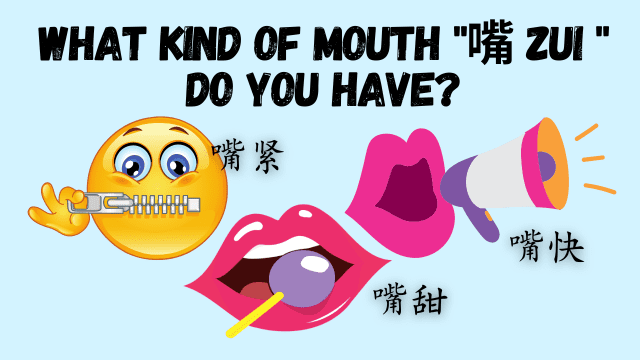Today, let us look at the Chinese word collocation for the Chinese word for mouth (嘴 zuǐ). From the collocation, we can understand what type of mouth (嘴 zuǐ) a person has. We can also guess from the Chinese word that follows after the Chinese word 嘴 zuǐ.

What is Chinese Word Collocation
Chinese word collocation 词语搭配 refers to the way in which certain Chinese words tend to occur together more frequently than others. This is an important aspect of the Chinese language that helps learners to understand how words are used in context and to communicate effectively.
Collocations can involve verb-noun combinations, adjective-noun combinations, adverb-verb combinations, and many others. For example, certain nouns and verbs have specific collocation patterns in Chinese, and deviating from these patterns can make a sentence sound awkward or incorrect. Collocations in Chinese can also convey nuances in meaning and tone, making the language more expressive.
(Having a strong grasp of Chinese collocations can greatly improve the fluency and naturalness of a learner’s spoken and written Chinese. Additionally, it helps to deepen understanding of the language, its cultural context and usage patterns. Therefore, it is a crucial part of acquiring Chinese as a foreign language.
Mouth in Chinese Language
The Chinese word “嘴” (zuǐ) is a noun that means “mouth.” 嘴 is a HSK3 Chinese word. As mentioned above, certain words in Chinese tend to occur together more frequently. Take嘴 for example, if you want to say “open your mouth”, the correct verb to use is 张开 and not 打开. The correct way to say open your mouth in Chinese is- 张开嘴 /张嘴zhāng zuǐ. The collocation for 打开 would be 打开门 open the door / 打开课本 open the text book etc.
Another example is “shut up”. Shut in Chinese can be 关 or 闭. The correct collocation for “shut up”is 闭(上)嘴 rather than 关嘴. Just like 打开,关 is use for关门 close the door/ 关窗 close the window。
Common collocations of 嘴” (zuǐ)
1. 嘴甜 zuǐ tián
嘴甜 is a colloquial expression that is used to describe someone who is good at using flattery or compliments to manipulate others or to get what they want. It is referring to a sweet-talker.
From the Chinese word甜 + 嘴, you would have guessed that it has something to do with sweetness. It does not mean that the person’s mouth taste sweet, but rather it is often used to describe someone who is insincere or deceptive. However, in some cases, it can be used simply to describe a person who is good at making others feel good through his words.
他的嘴甜得很你别上了他的当。
Tā de zuǐ tián de hěn nǐ bié shàng le tā de dàng.He is a sweet talker, don’t fall for his tricks.
2. 嘴快 zuǐ kuài
By looking at the Chinese word 快, which means quick, you would think that this phrase describes a person who talks quickly. Well, this is not the case here. The phrase 嘴快 actually describes a person who has loose lips and who likes to reveal private or confidential information to others.
他嘴快,不要在他面前说老板的坏话。
tā zuǐ kuài, bù yào zài tā miàn qián shuō lǎo bǎn de huài huà.
He has loose lips, don’t talk bad about the boss in front of him.
3. 嘴硬 zuǐ yìng
硬 has several meanings depending on the context. It can mean hard/stiff/strong, but over here it means stubborn, not yielding to other’s
嘴硬” (zuǐ yìng) is used to describe a person who knows that he/she has done wrong, but still refuses to admit mistake or defeat.
大家都知道是你做的,你还嘴硬不肯承认。
dà jiā dōu zhī dào shì nǐ zuò de, nǐ huán zuǐ yìng bù kěn chéng rèn.Everyone knows you are the one who did it, yet you still refuse to admit it.
4. 嘴紧 zuǐ jǐn
This Chinese phrase is a direct opposite of 嘴快. The word 紧 means tight in English. So, 嘴紧 describes a person who is tight-lipped. He or she is careful of his/her words and a person who can keep secrets.
他嘴紧又勤劳,是个值得信赖的人。
tā zuǐ jǐn yòu qín láo, shì gè zhí dé xìn lài de rén.He is tight-lipped and hard working. He is a man who can be trusted.
5. 嘴欠 zuǐ qiàn
嘴欠(zuǐ qiàn) refers to someone who speaks without thinking, often making careless or irresponsible remarks. 欠 in English means to owe or to lack. If you add 嘴 to欠, it becomes lacking consideration before speaking.
他这个人很嘴欠,说的话总惹人生气。tā zhè ge rén hěn zuǐ qiàn, shuō de huà zǒng rě rén shēng qì.He talks without any consideration and thus makes people angry whenever he opens his mouth.
6. 嘴痒 zuǐ yǎng
The Chinese word 痒 is equivalent to Itchy in English. From the word itself, it literally means mouth itchy. But, this Chinese phrase does not mean one’s mouth is itchy and needs medical attention. Rather, it means to speak whenever there is a chance to speak, a strong urge to say something.
他嘴痒痒的想把秘密说出来。
tā zuǐ yǎng yang de xiǎng bǎ mì mì shuō chū lái.He has a strong urge to spill out the beans.
7. 嘴馋 zuǐ chán
馋” is a Chinese word that means “greedy” or “craving.” So, 嘴馋” is a Chinese phrase that means “having a craving for food”.
他每次看到饺子就嘴馋。
tā měi cì kàn dào jiǎo zi jiù zuǐ chán.He craves at the sight of dumplings.
8. 嘴乖 zuǐ guāi
嘴乖 is a Chinese phrase used mainly on children who speak in a clever and loveable way. 乖 is a colloquial Chinese to mean “well-behaved,” “obedient,” or “good”.
这小女孩嘴乖,很讨老人家喜欢。
zhè xiǎo nǚ hái zuǐ guāi, hěn tǎo lǎo rén jiā xǐ huān.This little girl speaks well and is well received by the elderly.
We hope you enjoy this post. If you would like to support us, buy us a coffee ^^